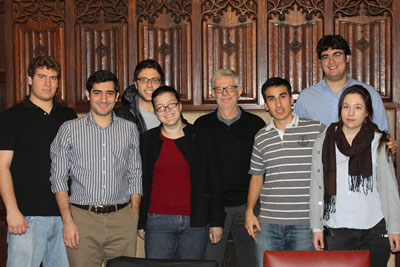
The annual Stavros Niarchos Foundation Lecture hosted Aristos Doxiadis, a renowned Greek economist and entrepreneur who offered an incisive fresh approach into the micro-origins of the Greek financial and socioeconomic crisis. Contrary to economic “seismologists,” who tend to place causes of the crisis in events in world financial markets, Mr. Doxiadis looks into the Greek economy as a “civil engineer,” who looks to improve the structural integrity of the house to be able to withstand any market “earthquakes.” Thus, he focuses on the systemic causes of the crisis, rather than on unpredictable events in the financial markets on which a small country like Greece has no control.
First of all, to explain the systemic roots of the crisis, Mr. Doxiadis focused on the “rentocracy” in Greece: the system of state-distributed unearned income (“rents”) among social groups, such as extra premia on pensions for certain professionals, which are based neither on work nor contributions. These “rents” account for much of the state deficit and are culpable for deep-rooted inefficiencies in the Greek economy. Nevertheless, since almost every family or social group seems to enjoy some form of rents, there is a widespread sense of democratic legitimacy in this form of unearned income. These practices reached unsustainable levels in later years, as the gargantuan state exacerbated the systemic problem of rent seeking and rent appropriation. In light of this narrative, which has yet to reach consensus in popular discourse, the Greek problem is better explained in its micro-roots of corrosive “rentocracy” that steadily built state deficit and debt, rather than on the unpredictable macro developments of 2008-2009.
Mr. Doxiadis then turned to an industry analysis of the Greek economy, dividing the sectors of the economy primarily into Tradable, those that compete in international markets for goods and services, and into Non-Tradable, those that do not. Further segmentation by size, into Small & Medium Enterprises (SME) of less than 250 employees and Big (>250 employees) helps us study the growth potential of those industries. His findings show that the large majority of the workforce (52.2%) is employed in the Non-Tradable SMEs, which are widely supported by white-collar rents, is mainly the domain of family industries, and consists of legally protected professions (e.g., Lawyers) or location-specific service providers (e.g., hairdressers). Because of the recession, demand and income falls for these industries and necessity will force the workforce to move from those to Tradable SMEs, as Mr. Doxiadis predicts. This process is arduous and cannot happen fast enough, but it is the only likely transformation toward a more sustainable economy.
It is also a different vision of “export-led growth” than the prescribed Foreign Direct Investment one, which suggests that capital injection could help Big Tradable businesses such as manufacturing, shipping and airlines to scale up and absorb the excess workforce. The FDI approach, however desirable, is less likely to happen, given the hostile investor environment and lack of assured stability. That is why Mr. Doxiadis suggests that Greece remove all remaining obstacles to SMEs, instead of attempting to attract FDIs, as the government has futilely attempted with Qatar, China and other failed attempts at attracting FDIs by a fast-track process.
This challenge is by no means small. Greece must overcome an institutional bias against capitalist growth, cut down on rent and regulation spillover from protected non-tradable industries, and remove the bureaucracy hurdles for opening a new business. While analysts (see McKinsey’s “Greece 10 years ahead” report) suggest that Greece has potential in growing big business in tradable industries in “Major Sectors” such as Tourism, Energy and Manufacturing as well as in “Rising Stars” such as Pharmaceuticals and Aquaculture, it is the small business that has more room to grow. McKinsey concurs with Mr. Doxiadis in identifying growth opportunities for SMEs in Medical Tourism and Elderly Care.
These latter niche industries, in particular, have the competitive advantage of capitalizing on Greece’s natural environment and on our surplus of qualified medical professionals. How easy is it for a qualified elderly care professional to open a retirement facility with medical services on a beautiful Greek island for affluent Germans? The answer to this and similar entrepreneurial questions may make the difference between prolonged recession and export-led growth for Greece in the next decade and beyond.
